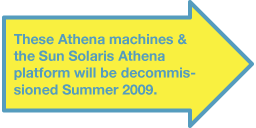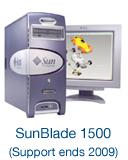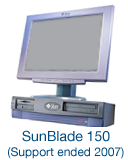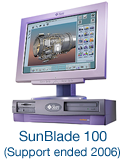Solaris Athena Is Reaching Its End of-Life
About four years ago MIT stopped purchasing and renewing desktop Sun Solaris Athena systems, both in public student Athena clusters and as workstations provided to the DLCs as part of the Athena program. This decision was driven by a variety of reasons:
- Linux Athena workstations increasingly deliver superior performance at a much lower cost
- Vendors target Linux as their primary Unix-based desktop platform for both commercial and open-source third-party software and support
- The high cost of developing a custom Solaris distribution with diminishing resources became prohibitive
- As a desktop operating environment, Sun Solaris has suffered from declining popularity and lack of industry/higher education adoption
- Standardizing on a single, Linux-based Athena desktop platform lets MIT leverage community efforts in software packaging, user interface development, and hardware integration
- IS&T can deploy, maintain, and support more machines in MIT's student computing environment with reduced resources
Support for Sun Solaris Athena Desktops Ends Summer 2009
As the four year life cycle comes to a close, IS&T wants to remind you that this summer marks the end of life for the few remaining Sun Solaris Athena systems in the public student cluster environment as well as those Sun Solaris Athena systems deployed to departments, labs, and centers as part of the Athena program.
Timeline
- Summer 2005: Initial communications about "Solaris sunset"; IS&T stops renewing Sun Solaris Athena workstations except by special request
- Summer 2006, 2007, 2008: Renewals of DLC and public student cluster workstations replace Sun Solaris Athena machines with Athena Linux systems
- Summer 2008: Analysis of Solaris-only third-party software packages and possible alternatives
- Spring 2009: Remaining Sun Solaris workstations come up for renewal
- Summer 2009: Remaining Sun Solaris workstations in public student clusters and most DLC Sun Solaris Athena systems are replaced with Athena Linux systems
- Fall 2009: Remaining DLC Sun Solaris Athena systems are replaced with Linux Athena systems where desired
- IAP 2010: Sun Solaris Athena systems in 37-318 4-167 ("holdout cluster") are replaced with Linux Athena systems
- Beyond IAP 2010: Athena Sun Solaris dialup systems (athena.dialup.mit.edu, x.dialup.mit.edu) will be around at least through IAP 2010
Alternatives
Solaris software packages
We are aware of three third-party academic software packages that do not run on Linux:
- ArcInfo suite (GIS)
- FrameMaker
- Acrobat Distiller
1. ArcInfo, ArcView, and ArcExplorer (GIS)
These three applications have been supplanted by the much more recent ArcGIS suite on Windows. ESRI (the vendor) has not supported ArcView or ArcExplorer on Unix platforms for some time now.
ArcGIS software is available to students on Windows computers maintained by IS&T and OEIT, as well as in DUSP's WIN.MIT.EDU cluster in 37-312 and departmental labs. ArcGIS is also available for installation on students' personal Windows computers (or via VMware in a virtual environment on their Macs). Additionally, the GIS lab in Rotch Library has ArcGIS workstations, along with many datasets and shapefiles for use with the software. ArcGIS is also available in MIT's Citrix environment.
2. FrameMaker
FrameMaker has been steadily declining in popularity in favor of more full-featured open office suites like OpenOffice, which are available on Linux Athena. OpenOffice is also available for personal use on student machines. For document conversion, the Athena Solaris dialups (athena.dialup.mit.edu) will continue to be available for a period of time after Sun Solaris Athena machines disappear from the public student clusters, but we encourage you to convert your FrameMaker documents to a more portable format as soon as possible. More information about converting FrameMaker documents can be found at http://kb.mit.edu/confluence/x/8h9B.
For users who still require FrameMaker, it is published for the Windows platform only and may be available at a discount through MIT's Adobe discount program: http://kb.mit.edu/confluence/x/EjJB
3. Acrobat Distiller
Used for generating PDF documents from PostScript, Acrobat Distiller is not available for Linux and has not been supported by Adobe for some time. OpenOffice users can easily generate PDF documents using the PDF output tools built into OpenOffice. LaTeX users may want to consider pdftex, which generates PDF files from LaTeX source. For all other PostScript to PDF conversions, consider using ps2pdf, which is part of the Athena release on Linux platforms. Many other open source applications now also support direct-to-PDF output without needing a third-party application.
Acrobat Professional, the successor to Acrobat Distiller, is available for the Macintosh and Windows platforms and may be purchased through MIT's volume licensing program. For more information, see http://kb.mit.edu/confluence/x/FTJB.
Students are also eligible to purchase Acrobat Professional at a discount. For more information on the discount program, go to http://kb.mit.edu/confluence/x/EjJB.
Risks
- Unknown dependencies on Solaris by software in local course lockers for courses/classes
- Unknown dependencies on Solaris by software in local lockers for departmentally developed applications used by students
- The need to switch over to and learn the Ubuntu-based Linux Athena operating environment
Help and support
If you have any concerns, questions, or are aware of potential issues related to the end of life of Sun Solaris Athena systems in the Athena environment, please contact Oliver Thomas at othomas@mit.edu or 617-253-9682. Depending on the nature of your concern or problem, IS&T may be able to offer additional migration advice, assistance, or mitigating solutions.
Sincerely,
Oliver
–
Oliver Thomas
Manager of the
Faculty and Student Experience
Information Services & Technology
Massachusetts Institute of Technology
othomas@mit.edu
+1 617 253 9682



